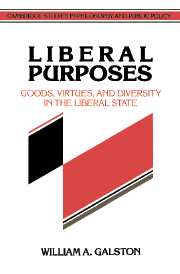Book contents
12 - Public virtue and religion
Published online by Cambridge University Press: 05 June 2012
Summary
Chapter 11 examined the ways in which civic education can appropriately foster the beliefs and character traits that help sustain a liberal community. In this chapter, I broaden the focus by inquiring into features of public culture – particularly, but not exclusively, religion – that many now see as hostile to liberalism, but which many in the past have seen as at least potentially (and in some cases actually) supportive. My thesis is that principled grounds exist for reconciliation between the combatants in the cultural wars of our generation but that if a cease-fire is to be effected, each side will have to moderate its most extreme (and least defensible) claims. Specifically, contemporary liberals who focus on individual rights and moral diversity must come to acknowledge the important respects in which the freedoms they cherish presuppose an underpinning of individual self-discipline and self-restraint. For their part, moral and religious traditionalists must learn to distinguish between the portion of their creed that can play a legitimate role in the public sphere and the portion that must remain within the confines of group practice or individual conscience.
Early liberal theorists worked to disentangle civil society from destructive religious quarrels. But they nevertheless assumed that civil society needed virtue and that publicly effective virtue rested on religion. Juridical liberalism, which focused on the exercise of liberty and the limits of government, presumed a foundation of individual moral conduct.
- Type
- Chapter
- Information
- Liberal PurposesGoods, Virtues, and Diversity in the Liberal State, pp. 257 - 289Publisher: Cambridge University PressPrint publication year: 1991

